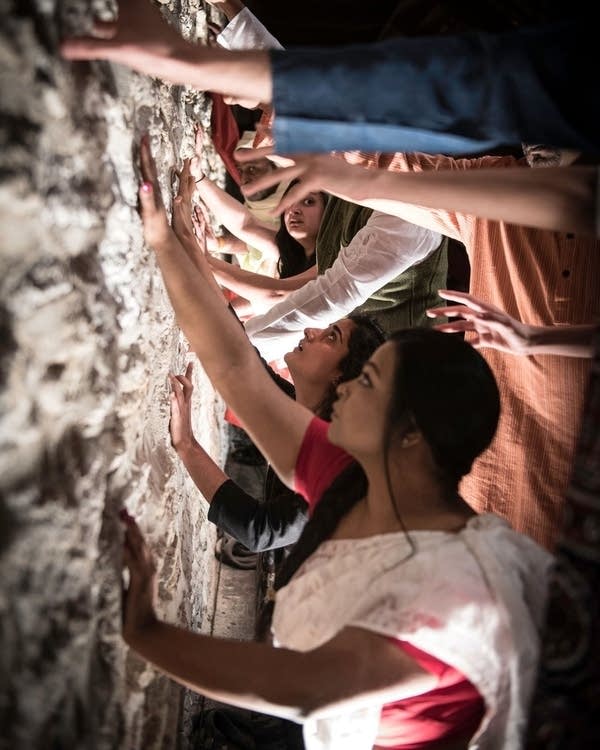In the play 'Five Weeks,' a line on the map draws blood

Go Deeper.
Create an account or log in to save stories.
Like this?
Thanks for liking this story! We have added it to a list of your favorite stories.
The partition of India and Pakistan in 1947 led to a massive exodus of refugees that still affects communities generations later.
The episode is also the inspiration for a new play, called "Five Weeks." The title refers to the time it took a British lord to draw up national boundaries for India and the new nation-state of Pakistan.
He took a map and drew a line, with a majority of Hindus on one side and a majority of Muslims on the other.
"Five Weeks" follows several different families — Hindu, Muslim and Parsi — in the months before and after the partition. Longtime neighbors become enemies, parents and children are torn from one another and many lives are lost.
Turn Up Your Support
MPR News helps you turn down the noise and build shared understanding. Turn up your support for this public resource and keep trusted journalism accessible to all.
Playwright Meena Natarajan said she wrote the play years ago, then set it aside. But current events in Syria and elsewhere compelled her to finish the play and produce it.

"The number of refugees that are out there, refugees that are being made because of borders, and then the immigration issue in this country," she said. "People not being allowed into countries. The kinds of violence that we're seeing on a huge and massive scale."
The play features beautiful live music, both folk and classical. While the majority of the play is in English, there's also dialogue in Punjabi, Hindi, Bengali and Urdu, with English translations projected on the back wall. The use of languages reflects the diversity of the region, where so many cultures and religions lived together for generations in relative peace and harmony. Natarajan said the arrival of the British, and three centuries of colonial rule, had a deeply divisive effect.
When the new borders of India, Pakistan and East Pakistan (now Bangladesh) were announced, religious and nationalist tensions erupted into bloody chaos. The Hindu minority in Pakistan fled in fear to India, while the Muslim minority in India likewise fled to Pakistan.
More than 15 million refugees were created. In some border cities violence reached a fever pitch; trains pulled into stations filled with corpses. Tens of thousands of women were abducted and raped. Generations later, partition stories are still shared with a mix of fear and awe.

Joydeep Haldar plays several parts in "Five Weeks." He remembers stories of his grandfather growing up in what is now Bangladesh, becoming a successful doctor and supporting the many women in his extended family. In 1947 he was forced to move them to Calcutta to make a new life, but he died soon after, leaving 14 women without any income. Haldar said the epic nature of the stories reminds him of the American movie "Gone With the Wind."
"It's almost like the Indian version of Scarlett O'Hara," he said, "in terms of how my grandma, who never had worked before — and this is in the '40s — how she marshaled a family of 14 women to survive and thrive and be successful."
Almost the entire cast of "Five Weeks" has personal connections to the partition of India. Haldar said they are still living with the consequences. India spends more on its military than Russia, and yet close to 200 million of its people don't get enough to eat.
"And here we are, three generations after what my grandfather went through," he said. "It's still there — it's a scab that refuses to heal, and we need to do something about it. We need to move on and recognize that we were once one people, and these wars that we fight just make no sense."
Pangea World Theater's production of "Five Weeks" runs through April 23 at the Lab Theater in Minneapolis.
Dear reader,
The trustworthy and factual news you find here at MPR News relies on the generosity of readers like you.
Your donation ensures that our journalism remains available to all, connecting communities and facilitating better conversations for everyone.
Will you make a gift today to help keep this trusted new source accessible to all?




